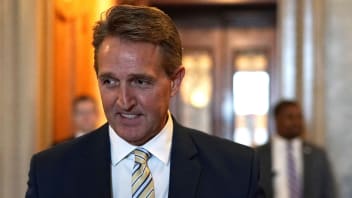Olive Branch
Democrats Must Decide If They Trust McConnell Before Ending Shutdown
The Senate Majority Leader put a new offer on the table, but it’s not clear whether any Democrats will take him up on it.
01.22.18 1:35 AM ET
With thousands of federal employees set to be furloughed beginning Monday morning after congressional leaders failed to reach a breakthrough in negotiations over the weekend, Senate Majority Leader Mitch McConnell (R-KY) is offering an olive branch to Democrats.
Now, ahead of a vote on Monday that would re-open the federal government, Democrats must decide whether to trust him to follow through on his promise to bring immigration legislation to the Senate floor by Feb. 8 if lawmakers fail to work out a broader deal by then.
Advertisement
Democrats have previously argued that they have no reason to put their faith in McConnell, pointing to instances in which the majority leader was unable to follow through on legislative promises even to his fellow Republicans. Moreover, they don’t believe the House Republican leadership will follow through, either.
In a short address from the Senate floor just after 9 p.m. on Sunday, McConnell said “it would be my intention to proceed on legislation that would address DACA [Deferred Action for Childhood Arrivals], border security, and related issues” if those bipartisan priorities are not resolved before funding expires on Feb. 8—assuming the government’s lights are turned on before then.
The promise—one aimed at winning over Democrats and Republicans who did not support Friday night’s four-week stopgap bill—underscores the trust deficit that has engulfed the Senate for months, and the historic inability of Congress to act on comprehensive immigration reform. A supermajority of Democrats in both chambers has, thus far, held the line on voting against any government funding bill that does not include legal protections for DACA recipients—the undocumented immigrants who were brought to the U.S. illegally as children.
It remains to be seen whether McConnell’s colleagues—Democrats, in particular—will be willing to take the majority leader at his word. But according to early indications on Sunday night, such a proposal was unlikely to win over enough Democrats.
At least one lawmaker—Sen. Jeff Merkley (D-OR), who is among a majority of Democrats banding together to block a government funding bill without DACA protections—immediately threw cold water on McConnell’s proposal.
“To be honest, I’m not sure how good [McConnell’s] word is on things like this.”
Related in Politics
Jeff Flake Screws GOP, Sides With Dems on Shutdown

Government Shuts Down Over Fight to Keep Dreamers in America

Dems Fold on This Shutdown, but the Next One Could Be Worse
“There has to be a pathway that is nailed down much better because McConnell’s version of regular order—he simply controls the place and does what he wants,” Merkley said Sunday night on MSNBC. “There’s very little trust… We haven’t ever seen McConnell stand up for his promises.”
The Senate will vote Monday at noon on a three-week government funding extension that will expire on Feb. 8. That decision came after senators were unable to resolve their differences over the weekend, though both McConnell and Senate Minority Leader Chuck Schumer (D-NY) hinted Sunday that they were inching closer to a potential deal to reopen the federal government two days after it was forced to shut down Friday at midnight.
McConnell’s assurances on DACA-related legislation were enough to win over two of his Republican colleagues who voted against a four-week extension that most Democrats also opposed, forcing a government shutdown.
Sen. Jeff Flake (R-AZ)—who is not seeking re-election this year and has openly expressed his frustrations with McConnell—said on Sunday night that he would vote for the short-term spending bill after receiving McConnell’s assurances on an immigration bill.
But the Arizona senator has heard this kind of offer before. In exchange for his vote on the GOP’s tax overhaul legislation in September, Flake said he had received a “firm commitment from Senate Leadership and the administration” that the Senate would vote on immigration legislation in January. Similarly, Sen. Susan Collins (R-ME) was guaranteed floor votes—initially before the end of December, and then early in the new year—on two bills aimed at stabilizing the Affordable Care Act’s health insurance markets.
Flake’s immigration promise will almost certainly be broken, while the health-care bills Collins has sponsored remain stalled.
And despite McConnell’s pledge on immigration-related action before Feb. 8, his deputy, Senate Majority Whip John Cornyn (R-TX), shot down that idea just a few hours earlier, saying it created an artificial cutoff because the official deadline to address DACA before it lapses is in early March.
“We’re more than happy to have a vote on it well before the deadline,” Cornyn told reporters. “Turning the agenda over to Democrats who just shut down the government makes no sense to me. It just seems like it encourages bad behavior.”
In a brief interview on Sunday night, Flake told The Daily Beast that failure to reopen the government on Sunday night would make it “immeasurably” harder for Democrats and Republicans to come to an agreement—especially because the true effects of the shutdown will be felt starting on Monday morning.
“Once you’re into a real shutdown after the weekend, it just becomes far more difficult,” said Flake, who co-authored a bipartisan immigration package last week.
Even though Flake is on board for Monday’s vote, it will be difficult for McConnell to win over the dozen or so Democrats who are necessary in order to break the stalemate. There was no immediate indication on Sunday night that McConnell’s new terms would move the ball with Democrats, who—save for five of them—voted en masse against Friday’s spending bill.
“Talks will continue, but we have yet to reach an agreement on a path forward that would be acceptable for both sides,” Schumer said Sunday night.
Complicating matters for Democrats is their skepticism that House Speaker Paul Ryan (R-WI) will follow through on McConnell’s stated plan for a hard deadline of Feb. 8. Conservatives too have openly criticized McConnell for making promises on items that House Republicans oppose en masse.
“To be honest, I’m not sure how good [McConnell’s] word is on things like this,” a senior House GOP aide told The Daily Beast. Aides on both sides of the aisle doubt that McConnell’s assurances will influence Ryan—a feeling that is likely to prevent Schumer’s left flank from getting on board with McConnell’s proposal.
As the Senate works to resolve its differences, Democrats and Republicans have both expressed frustrations with President Donald Trump, who spoke on the campaign trail of his deal-making abilities but has not brought the two sides together and has instead resorted to political sniping on Twitter. Some Republicans are hoping that Trump stays out of the tense negotiations, partly because of his apparent shifting positions in recent weeks on the specifics of an immigration plan.
“I don’t think it’s helpful for him to be involved right now,” Flake said, arguing that the Senate should not be bound by Trump’s whims
Above is from: https://www.thedailybeast.com/democrats-must-decide-if-they-trust-mcconnell-before-ending-shutdown



